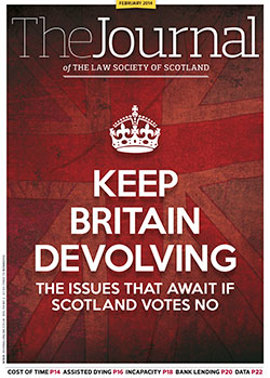Loosening the purse strings

Lawyers who worry about the profession’s seemingly poor public image should perhaps be grateful that they are not bankers. Most people who have recently dealt with a lawyer, at least, give them a good rating. Banks, on the other hand, certainly where smaller businesses are concerned, are the subject of a constant litany of complaint about unfair practices and decisions as to whether, and on what terms, finance might be available.
Or is that picture still accurate? For nearly three years now, the Banking Taskforce member banks (most of the big names, though not the Clydesdale or the Nationwide) have had in force a formal appeals process for lending decisions. Open to any business whose group turnover does not exceed £25 million, it comes under the supervision of an Independent External Reviewer, officially so named, who among other things works to ensure that each lender’s appeal system is conducted under a common set of principles.
If you didn’t know that, you are not alone. Although since its inception in April 2011 the appeal service has taken around 8,000 cases, releasing an additional £40 million into the economy through a near-40% success rate, both the Government and the Reviewer, Professor Russel Griggs, believe that too few businesses are aware of its existence. A campaign to raise its profile is now underway.
Spread the message
Since the darkest days of the credit crunch, the banks’ reputation of being unwilling lenders has persisted. Writing in his 2012-13 annual report, however, Griggs maintains that at present “the issue is one of demand rather than supply in terms of lending that can be sanctioned… The issue is as much about finding good projects to lend to or SMEs who want to increase their credit”.
One might think that if banks notify disappointed applicants of their right to appeal, that would ensure the information reached the right people. Griggs, however, believes that negative perceptions of the banks are having a wider effect, in that many businesses are simply not asking for money because they think they won’t get it, or the terms will be too steep.
“It’s very difficult, because at any one time there are probably only about 30% of SMEs looking for finance,” he tells me. “So unless you’re looking for finance, why would you know about the appeal scheme? My view has always been that the more people who know about the scheme, the more people are liable to borrow.”
The information flow
How, then, does it work? True it is that appeals are heard within each bank’s own structures, and the Reviewer’s role is simply to oversee the proper working of the process. But, as the banks had to start from scratch in setting up their systems, Griggs was able to work with them “to put in place a consistent framework for what they needed in an appeals process to do it properly,” as he puts it. While there are differences between the banks, reflecting their different structures, Griggs says: “They all operate within a consistent framework, which is that they’re transparent, they’re honest, they’re fair. And for me this has always been an education process, about how to build a proper conversation between the customer and the bank”.
Griggs, whose managerial career has ranged across the private sector – Scottish Enterprise, a merchant bank, and since his “retirement”, public sector boards including Better Regulation Scotland – emphasises that these reviews have to be done by someone completely separate from the initial decision taker. He says: “All the banks have done that very well: they’ve set up their own internal appeal teams, who tend to be senior experienced underwriters or risk people, so they are doing it properly.”
His own function, and that of his team of auditors, is not confined to looking at the cases of individual complainants: they go over a large proportion of the banks’ case files.
Griggs explains: “In the first year, we looked at them all, but now that the numbers have gone up, we look at a percentage of the decisions that the party under appeal has made, to see if we agree them, and to date we haven’t found one that we disagreed with. So they’re doing it properly – they’re not just corroborating what their colleague has said, because in the first year in 40% of the cases they overturned the decision of their colleague.”
Beyond that, the team has reviewed some of the files of clients who didn’t appeal a refusal, “and I’m happy that the ones they are turning down are not people who could have appealed, or are a tiny percentage of them. There isn’t a big pool of people out there that are being turned down who shouldn’t have been turned down”.
What in fact happens with most successful appeals – over 90%, according to Griggs – is that the prospective borrower comes up with better information to satisfy the bank. This is the “better conversation” factor he cites as one benefit to flow from the appeal service.
In addition, some banks have since changed their practices so that decisions are taken at a less early stage, again making them better informed. Griggs observes: “To me there is a real chicken and egg here, in that a lot of SMEs complain about the amount of information the banks ask of them. But my advice to them is always that the more information you give the bank, the more likely it is that you will get a better decision.”
And the small print?
Importantly, while covering all forms of lending, including credit cards – often relied on by very small businesses for cheap short-term finance – the appeal service is not just about the yes or no to the principle of a loan. Terms and conditions can also be brought under review. “In basic terms, I tell people, you can appeal against anything, including, ‘I just don’t think it’s fair.’ The only thing that’s not appealable is price. You can’t appeal against the interest rate, because that tends to be a calculation that’s done right at the very end… It’s always been a peculiarly difficult thing to appeal against.”
So nothing can be done if a bank says, we’ll extend your loan, but put your interest rate up?
“Well, the answer is it depends on the bank. A lot of banks do allow those, and we kept it fairly flexible, so if a bank wants to accept an appeal on almost anything, that’s up to them.” That leads me to raise those cases, recently reported, of businesses that failed earlier in the recession, blaming oppressive terms imposed by their bank as contributing to their downfall. Is that now a thing of the past?
“Those cases you are referring to are in the banks’ special care unit. Those are the companies that the bank thinks are in serious financial difficulties heading for bankruptcy, so they tend to treat them differently from their ordinary clients, if I can put it that way.”
Decision time
If you are dissatisfied, there is only a 30-day window in which to appeal. While the banks may not always apply that rigidly, Griggs comments, “I don’t encourage them to stretch it much because I think 30 days is a reasonable time to ask any business to make up their mind about whether they want to appeal or not.”
He adds: “The message I’m trying to get out there is, a lot of people say to me, the bank will never change their mind. Well, they’ve changed in 40% of the cases, so that does mean that it’s working. We’ve just reached our 40th million that we’ve put back into the economy.”
Summing up, Griggs believes the benefits of the appeal service are threefold: more money invested; improving the “conversation” between the bank and the customer – as relationship managers are now recognising; and encouraging banks to make changes to their systems, saving money while also improving customer relations.
“My message to your readers is that lawyers and accountants have a lot to help in this, by telling clients about the appeals process, and making them aware that when a bank asks for information, they usually want it for a reason, and not giving it can affect their decision.”
A mismatch of expectations?
While bank-customer relations may not be very harmonious at present, Professor Griggs in his latest annual report does not see this as anything new.
“We have forgotten businesses and banks have never had a perfect relationship and, from all my years in business, there have always been complaints about specific businesses finding it difficult to find finance,” he comments. “It will never be perfect going forward either, but the noise that was prevalent just post-2008 was caused by a shock that none of us had experienced before, and that has now settled down.
“Therefore, I do not now see anything that has not been about for decades, if not centuries, between businesses and banks. The basic challenge remains one of expectation between banks and SMEs. Banks see themselves as debt, not equity, providers, so therefore take less risk and demand assurance that the debt can be paid through their affordability processes.
“SMEs, especially small ones, do not always see the difference between debt and equity, so still ask banks at times for debt that is in effect equity and so beyond the risk boundary that debt would allow the banks to operate within.
“Having said all the above, I do think that the appeals process itself is having a real positive impact on lending to SMEs, both in terms of the way banks are changing the way they do certain things and also identifying other issues that others need to rectify if there is to be a sensible lending environment between banks and business, which meets the needs of each, as much as it has ever been possible to do.”
In this issue
- Cold case examination of early childhood evidence
- Incentivising employee ownership
- The diversity imperative
- Towards a more inclusive democracy
- Journal magazine Index 2013
- Reading for pleasure
- Opinion: Campbell Read
- Book reviews
- Profile
- President's column
- RoS's services for solicitors
- Issues for the Union
- Critical mass
- Is this where it ends?
- Testing capacity
- Making plans for auto-enrolment
- Loosening the purse strings
- Data: don't be caught out
- Punished enough?
- Prior statements practice
- Family business musings
- TUPE: armour not gold-plated?
- Pension policy - a vote winner?
- Scottish Solicitors' Discipline Tribunal
- In with the system
- Check and double-check
- Lender Exchange ahead
- Have you the capital?
- How not to win business: a guide for professionals
- Reflections from the Complaints Commission
- Ask Ash
- Danger spots
- It's the name of the game
- Law reform roundup
- Conference aspires to judicial diversity






